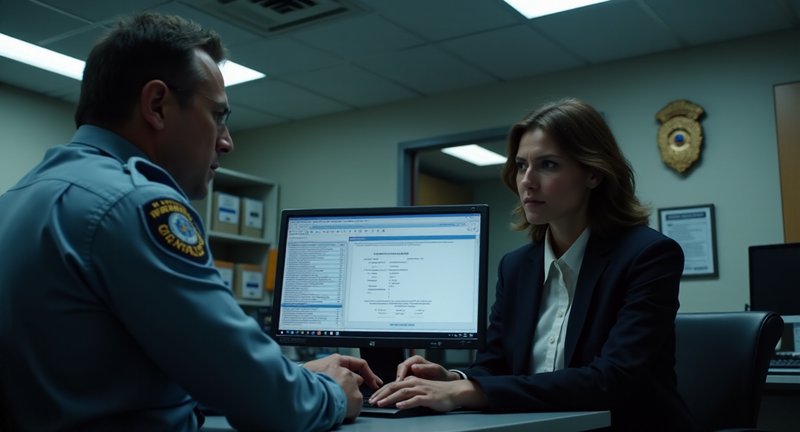How Can I Check If Someone Has a Warrant
Navigating the intricate world of warrants can feel like deciphering a cryptic code. You might be asking yourself, ‘?’ Believe me, I’ve been there too.
The first step I recommend is to visit your local law enforcement agency’s website. Many police departments offer online databases that are surprisingly user-friendly. Just a few clicks can lead you to the information you need, often quicker than you can say ‘warrant search.’
If the digital route feels like a labyrinth, picking up the phone might be your best bet. Call your local courthouse or police department directly. They’re usually quite helpful, and a friendly officer can guide you through the process. Sometimes, all it takes is a quick conversation to unveil the details you seek.
Another clever approach is utilizing public records. Depending on where you live, warrants can sometimes be found in publicly accessible documents. Websites that aggregate public records can be gold mines for this kind of information.

Also, don’t overlook the power of social media. In some areas, community groups and forums can provide leads. Fellow residents often share valuable insights that could steer you in the right direction.
As a matter of fact, if you’re feeling adventurous, consider hiring a private investigator. They specialize in digging up information and can often find details that are not readily available to the public. It’s a bit of a splurge, but it might save you a lot of trouble down the line.
So, whether you go online, make a call, or even engage an expert, you have multiple avenues to explore when pondering, ‘?’
Understanding How Can I Check If Someone Has a Warrant
Navigating the labyrinth of legal records can seem daunting, especially when you’re trying to uncover whether someone has any outstanding warrants. From my own explorations, I’ve learned that a mix of curiosity and caution goes a long way in these situations. Here’s how to approach this topic without getting lost in the weeds.
Steps to Uncover Warrant Information:
-
Online Databases:
- Various public record websites can provide a treasure trove of information. By entering the individual’s name and location, you might just strike gold.
- Many state and county law enforcement websites offer searchable databases.
-
Court Records:
- Visit your local courthouse sometimes, old-fashioned methods yield the best results.
- Request access to court records. They often contain detailed information about outstanding warrants and legal proceedings.
-
Contact Law Enforcement:
- A simple call to the local police department can provide insights. Just be prepared for potential privacy limitations.
- Some jurisdictions may offer anonymous tips regarding warrants.
-
Third-Party Services:
- Consider hiring a private investigator if the stakes are high. They have access to comprehensive databases and the expertise to navigate them.
-
Public Notices:
- Keep an eye on local newspapers or online community boards. Warrants are sometimes announced in public forums, especially for high-profile cases.
Points to Keep in Mind:
- Privacy and Legal Issues: Always approach this topic with respect for privacy laws. Not everyone wants their information broadcasted, even if it’s public record.
- Verify Sources: Information can be misinterpreted or outdated. Ensure that what you’re reading is credible.
Remember, uncovering such details can be sensitive, so handle the information with care. It’s a journey that can reveal more than just legal statuses sometimes, it offers a glimpse into the lives of those around us.

Understanding Warrants: What You Need to Know
Understanding warrants can be quite a journey, much like navigating through a dense forest. At first glance, the term might seem daunting, but let’s peel back the layers together. A warrant is essentially a legal document that allows law enforcement to take specific actions, such as arresting someone or searching a property.
From my own experiences, I’ve learned that warrants can come in various flavors. There are arrest warrants, which are typically issued when someone is suspected of a crime. Then there are search warrants, allowing officers to enter a location to find evidence related to a crime. Each type serves its own unique purpose in the grand scheme of law enforcement.
If you’re curious about someone’s legal standing, knowing the intricacies of warrants is crucial. It’s like piecing together a puzzle; each piece provides context and clarity. However, understanding warrants isn’t just about legal jargon it’s about the impact they can have on people’s lives.
I’ve often found that individuals are blissfully unaware of the potential consequences of having an outstanding warrant. Imagine finding out you have a legal cloud looming overhead; it can be a shocking revelation. This is why staying informed is key to safeguarding your peace of mind.
While it may seem overwhelming, having knowledge about warrants can empower you. Being proactive means you can navigate the legal landscape with confidence. So, if you ever find yourself in a situation involving a warrant, take a deep breath and approach it with clarity.
Why It’s Important to Check for Active Warrants
Traveling can be an exhilarating adventure, but there’s a hidden pitfall lurking beneath the surface: active warrants. Believe me, I learned this the hard way on one of my escapades.
Imagine the thrill of your journey being interrupted by an unexpected encounter with law enforcement. It’s a chilling thought, yet it’s a reality for some travelers. Knowing if you or someone in your group has outstanding legal issues can save you from unnecessary headaches.
Checking for active warrants before you embark on your trip can feel like peeling back the layers of a mystery. You’d want to ensure that the thrill of exploring new destinations isn’t overshadowed by unforeseen legal troubles.
I’ve seen friends unwittingly land in hot water simply because they overlooked this crucial step. It’s like sailing into a storm when you could have checked the forecast.
What’s more, the world is interconnected, and legal systems can extend beyond borders. A warrant in one state can make its way into the records of another. This might sound like a plot twist from a movie, but it’s all too real.
So, the next time you pack your bags and dream about sandy beaches or towering mountains, take a moment to reflect. Are you fully aware of the legal landscape you might be stepping into?
In the end, it’s all about ensuring your travels remain filled with joy and discovery, rather than becoming tangled in legal webs.
Legal Implications of Having a Warrant
Traveling with a warrant hanging over your head can feel like you’re trying to outrun a shadow, even when you’re on a much-needed vacation. The legal implications of having an active warrant can catch you off guard when you least expect it think border crossings, airport security, or even a routine traffic stop while driving through a new state.
Firstly, let’s talk about the types of warrants. Not all warrants are created equal. There are arrest warrants, bench warrants, and even search warrants. Each of these comes with its own set of consequences, but for travel, arrest and bench warrants can turn a carefree trip into a legal nightmare.
Here’s where it gets tricky. Depending on where you are, law enforcement can act on a warrant differently. For instance, domestic flights might seem safe, but international travel? That’s a whole other ballgame. Getting flagged while attempting to cross a border could lead to immediate detention. Yes, it sounds dramatic, but in reality, customs agents don’t take these things lightly.
Legal headaches don’t just stay at the border. You could be in the middle of a perfectly pleasant road trip, then get pulled over for something as minor as a broken taillight, only to find yourself in handcuffs because of a lingering warrant. It happens more than you’d think.
When discussing handling a warrant, knowledge is power:
- Know where your warrant is active.
- Contact an attorney before traveling.
- Resolve the issue before stepping into an airport or crossing state lines.
Sure, travel is about adventure, but ignoring a warrant? That’s not an adventure anyone wants. Tying up these loose ends is a favor you do for yourself, ensuring your trip doesn’t end in a jail cell.
How to Find Out if a Warrant Exists
Finding out if there’s a warrant hanging over someone’s head is a bit like hunting for a hidden clue in a mystery novel. You can’t just stroll into any office and ask. It’s more subtle than that, almost like a puzzle to be solved. The first step is to know where to look most warrants are issued through specific jurisdictions, so you’ll want to start by considering the state or county where the warrant might have originated.
One way to get a clearer picture is by checking online databases. Some states have dedicated warrant search portals, while others will have a section on their public records page. Trust me, these aren’t always the most user-friendly sites, but patience and persistence can often pay off. Sometimes, though, it’s like sifting through digital cobwebs to find that elusive information.
If that doesn’t work, you could also reach out to the local courthouse or law enforcement agency. Don’t worry, you don’t have to reveal too much personal info; you’re just asking for public records. Of course, calling a courthouse can feel a bit nerve-wracking, but they deal with this kind of thing regularly. Think of them as librarians of legal matters they’re there to help.
As a matter of fact, if the paper trail still evades you, consider reaching out to an attorney. Legal professionals often have access to databases and contacts that you might not even know exist. In some cases, they can navigate this terrain faster and more efficiently. Sometimes, the smartest thing is to let a pro take the wheel.
Utilizing Online Databases for Warrant Searches
When you’re planning a trip or just want to ensure everything’s smooth at home, the last thing you want is an unexpected encounter with unresolved legal matters. I’ve come across some incredibly handy online databases that help you check for outstanding warrants. These tools are surprisingly easy to use and can be a game-changer, especially when you want to avoid any unpleasant surprises.
Many states and counties have their own online portals where you can look up public records, including warrants. I’ve found that these databases often require only minimal information usually a name and location. Some even allow you to narrow the search by birthdate or other identifying details.
There are also third-party websites that consolidate warrant information from multiple jurisdictions. While these can be a little hit-or-miss depending on the accuracy of their data, they are excellent for casting a wider net across state lines.
To help you get started, here are a few steps:
- Visit the local sheriff’s office or police department website: They often have searchable databases specifically for warrants.
- Use state judicial websites: Many states provide online access to court records, where you can search for warrants.
- Check public records platforms: Websites like Instant Checkmate or BeenVerified aggregate data from various government databases, offering a broader view.
The key here is thoroughness. In my experience, it pays to cross-reference multiple sources. If one database shows nothing, another might have the missing puzzle piece. It’s like being your own detective, but with far less drama. At least, that’s the hope!
Stay diligent, and you’ll be able to sleep easier knowing that you’ve covered all your bases.
Accessing Court Records for Warrant Information
Court records have this peculiar way of being both obscure and surprisingly accessible if you know where to look. When I first dabbled into searching for warrants, I realized it’s often the local court system that holds the key. You’d be amazed how much information is just sitting there, waiting for someone with a little curiosity to dig into it.
Many courts have embraced the digital age, which is a gift to those of us who don’t have the time or inclination to visit in person. There are online portals, some more intuitive than others, that can provide what you’re after. It’s almost like a treasure hunt, really. But not all courts are on the same page, and for those, a good old-fashioned phone call or a trip downtown might be the way to go.
What struck me most was the variety of ways to access these records, from county websites to third-party services. However, it’s important to be mindful of the authenticity of your sources. The last thing anyone wants is to be led astray by inaccurate or outdated information, especially when you’re dealing with legal matters.
It’s easy to think of this process as daunting, but once you’ve navigated it a time or two, it starts to feel like second nature. You learn to embrace the quirks of each system, and before you know it, you’re uncovering details that might have seemed buried away in a sea of legal jargon. With patience, you can extract the information you need.
How Law Enforcement Agencies Handle Warrants
In my time exploring the intricacies of travel, I’ve occasionally come across stories where people find themselves on the wrong side of the law unexpectedly. Law enforcement agencies, whether it’s at home or abroad, handle warrants with a blend of routine procedure and careful investigation. They’re not about to leave any stone unturned when there’s a piece of paper with your name on it.
When a warrant is issued, officers treat it like a puzzle piece it’s just one part of a bigger picture. But the moment that piece clicks into place, it can set off a sequence of actions. I’ve noticed that agencies prioritize making sure that everything is done by the book, so there’s little room for error. Warrants, after all, come with a certain weight, and they don’t take them lightly.
Sometimes, they’ll act swiftly, especially if the warrant is tied to something urgent, like a flight risk. Other times, they exercise more patience, gathering details and figuring out where and when to act. And believe me, they’re always keeping tabs on various databases. I’ve seen how they coordinate between different jurisdictions, making sure no one slips through unnoticed.
Now, just because a warrant is issued, doesn’t mean it’s widely advertised. Law enforcement agencies often keep that information close to the chest, only pulling it out when absolutely necessary. But when the time comes, they’re ready, and they know exactly what to do.
There’s a rhythm to how these things play out, and it’s fascinating to watch. Every step they take is calculated, making sure that all the boxes are ticked before they make their move. It’s a process, yes, but one they’ve perfected over time.
A Detailed Look at How Can I Check If Someone Has a Warrant
When you find yourself wondering, ‘How Can I Check If Someone Has a Warrant?’ you’re probably thinking it’s a tough process. I’ve been there, too. But surprisingly, it’s a lot easier than you’d expect if you know where to look. Let me walk you through the steps.
1. Online Databases
First off, you can try online warrant databases. Many states and counties have public websites that allow you to search by name. Just plug in the details, and with a bit of luck, you might find the info right there. It’s free and quick – no need for any fancy tools.
2. Contact Local Law Enforcement
If you’re more of a “let’s make a call” kind of person, reaching out to local police departments can do the trick. I’ve found that law enforcement is usually willing to confirm whether there’s an active warrant just be respectful and honest about your inquiry.
3. Court Records
Another reliable source is the court records. Most counties have these available online or in-person at the courthouse. If you’re checking for someone you know well, like a family member, digging through court records can reveal much more than just warrant statuses.
4. Third-Party Services
There are also third-party services that provide background checks for a fee. In my experience, these are hit-or-miss. Sometimes they deliver, sometimes they don’t. Be sure to research their reliability before paying for anything.

It’s fascinating how many avenues there are to uncover this information, and none of them are too complicated. Just make sure you’re using these methods responsibly, and you’ll be on the right track.
Checking Local Police Departments for Warrants
From my own travel experiences, there’s one thing you don’t want to overlook – the possibility that there could be outstanding warrants, whether for yourself or someone you’re with. Checking with the local police department is a reliable way to confirm, and it’s surprisingly straightforward.
First off, understand that police departments operate on a mix of public and confidential information, so while they might not spill every detail over the phone, you can still gather what you need if you approach it right. Here’s what I’ve found useful:
- Visit in Person: If you’re comfortable and want fast results, just head down to the local station. They may require ID, so bring that along. It’s a bit more personal, but you’ll get direct answers.
- Phone Calls: Most police departments have non-emergency numbers. Be polite but direct in asking for information on potential warrants. Keep in mind, though, they might not give out details about third parties unless you’re legally involved in the case.
- Online Resources: Many departments have online databases you can access from anywhere. While this may not cover every county, it’s often enough to get a solid lead on your inquiry.
Timing matters, too. If you’re checking for warrants while in a different state, be aware of jurisdictional issues. Sometimes, smaller towns won’t have digital records or immediate responses, so patience is key.
The process might feel intimidating at first, but in my experience, the more prepared you are with proper documents and understanding of local laws, the smoother it goes. Besides, nothing beats the peace of mind that comes with knowing exactly where you stand!
State vs. Federal Warrants: Understanding the Differences
When we talk about legal systems, state and federal warrants are like two different animals. I’ve come across both in my time, and while they may seem similar on the surface, they operate in distinct lanes. Let’s break this down.
State Warrants
State warrants usually arise from violations of state laws. Think of local crimes: theft, assault, or even unpaid fines. These warrants are issued by local or state courts, and they mostly have authority within the state’s borders. Though, neighboring states might honor them too, depending on agreements between the jurisdictions. If someone gets a warrant in California, it’s not likely they’ll get picked up for it while vacationing in Florida unless it’s something major.
Federal Warrants
Federal warrants, on the other hand, are a whole different story. These come from breaking federal laws those that cross state lines or involve more severe criminal activities like drug trafficking, tax evasion, or kidnapping. The feds don’t play. A federal warrant doesn’t care about state lines. If it’s out there, it’s coming for you, whether you’re in New York or Alaska.
Key Differences
-
Jurisdiction:
- State Warrants: Only valid within the issuing state (with some exceptions).
- Federal Warrants: Valid nationwide.
-
Types of Crimes:
- State Warrants: Handle local violations (DUIs, theft, unpaid fines).
- Federal Warrants: Cover larger scale offenses (interstate crimes, federal tax evasion).
-
Enforcement Power:
- State: Local police handle enforcement.
- Federal: Federal agencies like the FBI or U.S. Marshals come into play.
Understanding these differences can help you know what you’re up against if either comes into play. Keep in mind, though, that no warrant should be ignored whether it’s state or federal. Trust me, it can catch up with you faster than you think.
The Role of Private Investigators in Warrant Searches
In my time working alongside private investigators, I’ve seen firsthand how they play a crucial role in the world of warrant searches. You might be surprised at just how much legwork goes into uncovering whether someone has a pending warrant. But it’s not just about digging through public records or sending out a few phone calls. It’s a craft, a process that demands persistence, confidentiality, and a sharp eye for detail.
Private investigators are hired for warrant searches for a variety of reasons. Whether it’s a concerned family member, a potential employer, or even someone looking out for their own safety, PIs bring expertise that the average person might not possess. Here’s where their skills shine:
-
Access to Databases: While a lot of public information is available online, PIs often have access to professional-grade databases that the general public can’t tap into. This includes in-depth criminal background checks, which are key to tracking down warrants.
-
Interpreting Legal Documents: A search through court records isn’t always straightforward. I’ve seen PIs sift through dense legalese, deciphering charges, court dates, and arrest histories, which can be challenging without a trained eye.
-
Confidentiality: Privacy matters. If someone needs to check on a warrant discreetly, a PI ensures that the investigation is done under the radar, avoiding unnecessary alarms.
-
Networking with Law Enforcement: PIs often have connections within law enforcement that allow them to verify information quickly. This is where having the right contacts pays off, especially when dealing with multiple jurisdictions.
Hiring a private investigator means peace of mind, knowing the search is being handled professionally and with care. After all, searching for warrants is more than just finding a needle in a haystack it’s about connecting the dots before that needle becomes a problem.
What to Do If You Discover a Warrant Against You
So, you’ve uncovered that there’s a warrant out for your arrest. It can feel like a punch to the gut, right? That first wave of anxiety might make you freeze, but trust me, the worst thing you can do is ignore it.
The next step is to stay calm and get informed. You’re going to want to understand the details: what is the warrant for, and which jurisdiction issued it? Once you have that, you’ll know what you’re up against.
You’ve got a couple of options from here, but sitting still isn’t one of them. If it’s a minor offense, you might be able to handle it by contacting an attorney or turning yourself in voluntarily. Believe me, this can be a game-changer in how authorities perceive your willingness to cooperate.
Now, if this is more serious, don’t wait for that knock on the door. Consult a lawyer immediately. They can guide you on the best path forward, potentially negotiating a resolution before you’re blindsided.
And whatever you do, avoid the temptation to travel or cross borders if there’s a warrant hanging over your head. Getting detained somewhere else will only complicate your situation, and suddenly you’re dealing with more than just the original problem.
At the end of the day, acting swiftly is your best bet. Take control of the narrative before it takes control of you.
How to Prepare for a Warrant Hearing
Preparing for a warrant hearing is an intense experience, but with the right steps, it’s manageable. I’ve walked this road before, and trust me, how you prepare sets the stage for everything that follows. Here’s a plan you can follow to ensure you’re ready.
-
Understand the Charges: Dive into the details. You need to know exactly why the warrant was issued, the charges involved, and any supporting evidence. Ignorance is never bliss in these situations.
-
Consult a Lawyer: You can’t walk into this hearing alone. Even if you think you’ve got it under control, the legal world is complex. A good lawyer will help you navigate it, ensuring your rights are protected and no important step is overlooked.
-
Gather Evidence: If you have proof that could exonerate you or at least clarify your actions, now’s the time to collect it. This might include documents, photos, emails, or even witness testimonies. Every piece can help.
-
Prepare Your Appearance: I know, this might sound superficial, but appearances do matter in court. Dress appropriately and make sure you carry yourself with respect. You want to show that you’re taking this seriously.
-
Know What to Say: This isn’t the time for improvisation. Rehearse your statements with your lawyer. Be concise, respectful, and clear in your communication. A prepared person is taken more seriously than someone who stumbles over their words.
As a matter of fact, stay calm. It’s easier said than done, but maintaining composure will help you think clearer and make better decisions when it matters most.
Answer Hub
Can you look up warrants in New York?
Yes, you can look up warrants in New York through various methods. The New York State Unified Court System offers an online search tool where you can check for active warrants. Additionally, you can contact local law enforcement agencies or check their websites for warrant information. It’s important to note that certain records may be restricted, so you may need to provide identification or specific information about the person in question.
How to look up warrants in NC?
To look up warrants in North Carolina, you can start by visiting the North Carolina Department of Public Safety’s website, which provides access to various criminal records. Local sheriff’s offices also maintain databases of active warrants that can be searched online. You may also consider contacting the specific county sheriff’s office directly for the most accurate and up-to-date information regarding warrants in that area.
How to look up warrants in New Jersey?
In New Jersey, you can look up warrants through the New Jersey Judiciary’s website, which offers a search function for public court records. Additionally, each county has its own sheriff’s department that may provide online access to warrant information. If you prefer to speak with someone directly, you can call or visit the local sheriff’s office to inquire about specific warrants and any related procedures.
How long does a bench warrant last in New York?
A bench warrant in New York does not have an expiration date and remains active until it is executed or canceled. This means that law enforcement can arrest the individual at any time, regardless of how much time has passed since the warrant was issued. If you believe a bench warrant has been issued against you, it is advisable to resolve the issue promptly to avoid any potential legal complications.
How do I find out if I have a warrant in Nassau County?
To find out if you have a warrant in Nassau County, you can contact the Nassau County Police Department or visit their official website for warrant information. Additionally, the Nassau County District Court may provide public access to warrant records. If you prefer a more discreet approach, consider consulting a legal professional who can assist you in obtaining this information safely.
How to find out if you have a warrant in Rochester, NY?
To determine if you have a warrant in Rochester, NY, you can check the Rochester Police Department’s website, where they may list active warrants. Alternatively, you can contact the department directly for assistance. It’s also beneficial to check the Monroe County Sheriff’s Office, as they maintain records of warrants in the area. Staying proactive is key to resolving any potential legal issues.
How to look up warrants in the USA?
To look up warrants in the USA, various resources are available. You can start by accessing state and local law enforcement websites, as many maintain online databases of active warrants. Additionally, national databases, such as those provided by the FBI or other federal agencies, can offer information. It’s also possible to hire a background check service to help you obtain warrant information more comprehensively.
How long does a misdemeanor warrant stay active in North Carolina?
In North Carolina, a misdemeanor warrant remains active indefinitely until it is executed or cleared. This means that law enforcement can arrest the individual at any time, regardless of how long it has been since the warrant was issued. It’s crucial to address any outstanding misdemeanor warrants promptly to avoid complications, including arrest or additional legal penalties.
How do I find out if I have a warrant in Wake County?
To find out if you have a warrant in Wake County, you can visit the Wake County Sheriff’s Office website, which often provides an online search tool for warrants. You can also contact the sheriff’s office directly by phone or in person for assistance. Additionally, the North Carolina court system may provide access to warrant records that can help you confirm your status.











This really gives you a glimpse into how methodical law enforcement can be when it comes to handling warrants. I’ve always wondered how they coordinate between different agencies, especially across jurisdictions, and it makes total sense that they’d keep things close to the chest until they’re ready to act. It’s almost like watching a well-rehearsed dance. Every move is planned, every step executed with precision. I once heard of someone getting stopped at the airport because of an old warrant they had no idea existed talk about a travel nightmare! Knowing how warrants are handled really helps put things in perspective.
It’s crazy how much is out there if you know where to look! The digital age really has made all this easier. Totally agree, you’ve got to be careful about outdated info. No one wants to waste time chasing a dead end.
This is so useful! I never even thought about checking for outstanding warrants when planning trips, but it makes total sense. It’s one of those things that’s easy to overlook, yet could cause huge issues later. I’ve used a few of those public records platforms, and it’s true cross-referencing is key. One site might not show everything. And, let’s be honest, being your own detective does make it feel like a mystery-solving adventure without the hassle of any drama. Definitely bookmarking this for future reference, thanks for the tips!
This actually makes me think of those true crime documentaries where people get caught unexpectedly. It’s kind of fascinating how finding a warrant is like solving a puzzle, but I can totally see why it’d be stressful. Searching through online databases does sound like a bit of a digital treasure hunt, but you’re right, it’s worth the effort. It reminds me of that time I tried to track down some old court records for family history research those sites can be a real pain! The suggestion to talk to an attorney is smart though. They probably cut through a lot of the red tape and can give you peace of mind much faster than doing it alone. Plus, the whole ‘librarians of legal matters’ bit made me laugh; they really do hold all the keys. I guess the lesson here is, if you don’t want your trip to turn into a legal thriller, it’s best to do your homework!
The idea of getting pulled over for a minor thing like a broken taillight and ending up in handcuffs because of a warrant is wild! I always thought warrants were only an issue if you were doing something really serious, but it makes sense that even small legal issues could pop up during travel. I’m planning a cross-country road trip soon, and this makes me think twice about making sure everything’s clear before I go. No one wants their adventure to end with an unexpected detour to the courthouse!
Wow, I never even thought about this being an issue while traveling! It’s crazy to think how something like an old, forgotten warrant could totally ruin your trip. I always get so caught up in the excitement of planning where to go that checking legal stuff like that slips my mind. This is such a great reminder that travel isn’t just about fun; there’s some serious preparation involved too. I’ll definitely be adding a quick warrant check to my pre-trip checklist from now on.
Understanding warrants really is like peeling an onion so many layers! Your analogy about navigating a dense forest resonates with me. Each type of warrant has its purpose, and it’s fascinating to learn how they impact people’s lives. I think many people don’t realize the importance of staying informed about their legal standing. It’s true; the last thing you want is to discover you have a warrant unexpectedly! Thanks for breaking it down and making it easier to grasp. Knowledge is power!
You hit the nail on the head about navigating the maze of legal records! It can be so overwhelming, especially if you’re new to this kind of research. I totally agree that a combination of online databases and good old-fashioned courthouse visits is often the best approach. I once had to dig into a neighbor’s legal history for a project, and I found that visiting the local courthouse gave me access to records that weren’t available online. It’s fascinating to see how much information is stored away in those dusty files! Your point about privacy is crucial too; I’ve noticed that people sometimes forget that not everyone wants their details exposed. I always try to remind others to tread lightly when delving into someone else’s past. Plus, verifying sources is a must I’ve come across some really questionable information online. Your insights are super helpful for anyone looking to uncover warrant information while being respectful and cautious. Keep sharing this knowle
Navigating the world of warrants truly feels like a puzzle, doesn’t it? Your advice about checking local law enforcement websites is spot on! I remember when I had to look up some warrant information for a friend, and I was surprised by how user-friendly those databases can be. It’s like they want to help us! I also appreciate your mention of the power of a simple phone call. The last time I called my local police department, the officer was so helpful and guided me through the whole process without any hesitation. I never thought that getting such information could be so straightforward. And hey, social media is a great tip too! I’ve seen community forums where people share insights and tips that can be incredibly valuable. Honestly, it can feel like a treasure hunt, and sometimes, hiring a private investigator can be worth the peace of mind. Thanks for breaking it down so clearly and giving us multiple avenues to explore. You’ve really made this topic accessible a